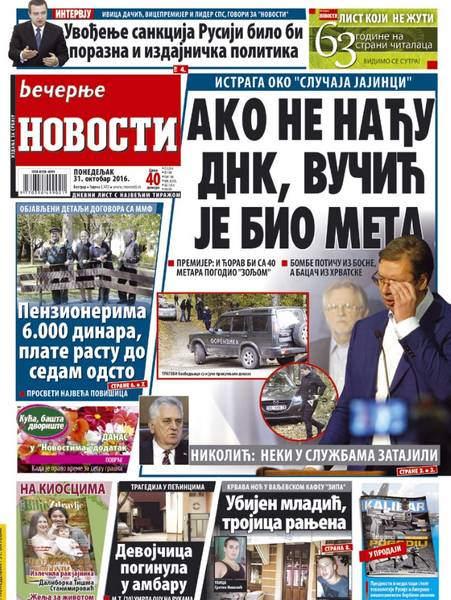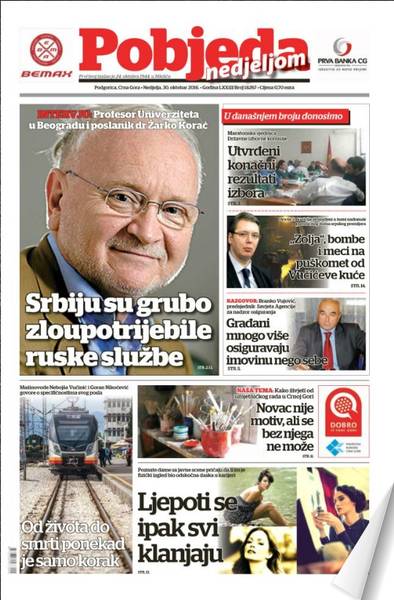Dačić: If We Introduce Sanctions against Russia, We Lose Kosovo
Adelina Marini, October 31, 2016

The week on the Balkans begins with several very interesting interviews – with the Serbian First Deputy Prime Minister and Minister of Foreign Affairs Ivica Dačić, with Bosnia and Herzegovina President Bakir Izetbegović, and the Serbian university professor Žarko Korać – in addition to the development of the espionage drama in Serbia, now progressing into a terrorist attack threat phase. Will Erdoğan come for the second time this year to Croatia and what is pernarism are the rest of the subjects in today’s review of regional press.
Chapters 35 and 31 are interconnected for Serbia
The most important interview from an EU perspective today is with Ivica Dačić for the Serbian daily newspaper Vecernje novosti. In it, he clarifies several very important elements, which were central subjects of last week’s press in the region – the dialogue between Belgrade and Priština – and even calls for a referendum, which is against the position of Prime Minister Aleksandar Vučić. According to Mr Dačić, if Serbia should turn its back to Russia and introduces sanctions against it, an opportunity will be opened for Kosovo to become a full member of the United Nations. “If we introduce sanctions against Russia, soon we will have an independent and fully internationally recognised Kosovo. We would not harm Russia in any way, but only Serbia. This we do not agree with. At the end of the day, let the people decide in a referendum what do they want”, said the former spokesperson to Slobodan Milošević in his interview for Vecernje.
”Things are quite simple”, he explains. “At the moment, Kosovo has a majority in the UN General Assembly and could quite easily push through their goal. The UN Security Council is the last line of defence before Kosovo receives a seat on the East River (where the UN building is located in New York), but here come Russia and China. They have the right to veto against this and are constantly keeping the Kosovo question open. Leaving emotions aside, we cannot betray these states, because this way we would be harming ourselves. Should we lose these friends, we will find no others to protect our interests”, believes the Serbian foreign minister. He continues to be convinced it is better not to open soon Chapter 31 of the negotiation process, which covers foreign affairs, for this way the making of a decision on levying sanctions on Russia can be postponed.
A threat to Aleksandar Vučić
Subject number one in Serbian media is the gun arsenal discovered over the weekend in close proximity to the family home of Prime Minister Aleksandar Vučić. This is one more episode of the geopolitical thriller, which has been shaking Serbia and the region over the last few weeks. Serbian state TV channel RTS quotes Minister of Internal Affairs Nebojša Stefanović, according to whom part of the discovered arsenal came from Croatia and the rest from Bosnia and Herzegovina. A DNA analysis is yet to be performed. Prime Minister Vučić stated unequivocally that if no DNA traces were found, “then we will know who we are dealing with”. The cover page of Blic says that the DNA analysis will solve the mystery. Vecernje novosti also shouts from its headline that if no DNA is found, it means that the target of these weapons is the prime minister.
Croatian Jutarnji list reports on the occasion of the discovered arsenal that Serbia is currently situated in a very politically sensitive situation, for the election campaign for the presidential elections has already began, in which President Tomislav Nikolić is playing the Russian card and wants Vučić’s support. Last week, Serbia was in the middle of the scandal, due to its nationals being apprehended in Montenegro on charges that they have planned attacks in the occasion of a victory for the party of Milo Đukanović, reminds Jutarnji.
The line of spy affairs in Serbia and especially in the context of allegations of a thwarted attempt at a terrorist attack in Montenegro are the causes for the other very interesting interview of today. The former politician and boss in the security agencies, currently professor in the Belgrade University, Dr Žarko Korać tells the Montenegro Pobjeda that the “Montenegro” affair shows how Russian agencies have ruthlessly abused Serbia. “The number of people in Serbia, who have an interest in Montenegro changing its domestic and foreign policy, has grown. And they received serious support from the Russian Federation which, because of relations with the West,  because of the annexation of Crimea, sees the case 'Montenegro' as a litmus test for its influence in the region and especially in Serbia and Republika Srpska”, says Korać.
because of the annexation of Crimea, sees the case 'Montenegro' as a litmus test for its influence in the region and especially in Serbia and Republika Srpska”, says Korać.
“The thing that brings serious concern is that Serbia served as a manoeuvring ground for aggressive, illegal, and too dangerous actions against the legitimate leadership of Montenegro and are a textbook example of interference in the domestic affairs of a neighbouring state. It is not just pro-Russian groups and individuals, but ever more evidently it was Russian agencies, which have ruthlessly abused Serbia, in order to, according to currently available data, help the organisation of an armed attack after the end of elections in Montenegro”, continues the specialist, whose interview is on the cover page of Pobjeda. The professor also says that Russia’s influence in the region is growing and makes the connection with the Ukraine conflict:
“First of all, they have invested a lot of money in media propaganda and it is already bearing fruit. It is now clear that the Serbian volunteers in Donbas were an easy prey for the Russian agencies and several of them turned into their fifth column in Serbia. There are political and other forces, which are capable of anything, including murder, in order to hinder our country on its way towards EU integration. Our European integration has practically brought to light its deadly enemies, who have so far been hiding”, is the opinion of Doctor Žarko Korać.
There will be no Bosnia and Herzegovina federation
In an interview for the Bosnian Klix, the President of the BiH Presidency Bakir Izetbegović replies to Croatia’s requests for constitutional changes, which are to secure equal rights for the Croats in the country. A subject, which got raised once again on the occasion of the first visit of the new Croatian Prime Minister Andrej Plenković to BiH at the end of last week. He states in the interview that the only constitutional change that there is agreement on is the implementation of the ruling of the European Court of Human Rights in the Sejdic–Finci case, which had been blocking BiH’s European road for years. “The introduction of the question of wider constitutional reforms will redirect the focus from essential priority issues”, believes Izetbegović.
He quotes the BiH Foreign Minister Igor Crnadak from his participation in the Globsec summit in Bratislava over the weekend, where he said that BiH does not need a third entity (of Croats), nor a Dayton 2, but strong economic growth and efficient processing of the cases of corruption at the high levels of power. “I agree with Minister Crnadak that this is the only way to bring back optimism and give perspective to the citizens of BiH”, says Mr Izetbegović for Klix. He claims that Croatian representatives do not have the true analysis and information and are “blindly” following the situation in BiH and supporting what the leadership of HNS requires of them. “Those are unclear, watered down positions about some sort of federalisations, about the right of Croats to widen their vital national interest and block any issue that Parliament is dealing with on no motives whatsoever. I do not believe that serious politicians of European dimension like Andrej Plenković would truly stand behind those requests, which are against the BiH Constitution, the Dayton peace agreement, European, and democratic standards in general”, is the opinion of the Bosnian president.
Erdoğan in Croatia for the second time this year?
Vecernji list reveals it is possible that Turkish President Recep Tayyip Erdoğan will visit Croatia for the second time this year on the occasion of the opening ceremony for the building of a mosque and an Islamic cultural centre in the Croatian town of Sisak. The information about the upcoming visit of Mr Erdoğan has been confirmed exclusively for Vecernji list by the president’s adviser for Balkan countries Sabri Demir. Demir claims that an invitation has been received, coming from the office of President Kolinda Grabar-Kitarović on the occasion of the official ceremony of the centre on November 12. The invitation was gladly accepted by Erdoğan, who believes that Croatia is a great friend of Turkey. The office of President Grabar-Kitarović, however, disproved the information, stating that no such invitation was ever sent. Vecernji reminds, however, that Erdoğan’s visit to Croatia in May was kept secret to the very last moment, despite Vecernji announcing some exclusive and correct information 20 days prior.
The “Pernarism” phenomenon
By the same token this could be “LePen-ism”, “Farage-ism”, or “Trump-anism” – the multiple faces of post-factual populism. The left-wing Rijeka daily newspaper Novi list looks for an answer to the question of the source of the lightning-fast growth of popularity of the anti-EU and anti-NATO party Live Wall and its leader Ivan Pernar. Answer to this question is provided to the newspaper by the political analyst Žarko Puhovski, according to whom the main culprit for the appearance of Live Wall is the former leader of the green ORaH party Mirela Holy, who briefly led her party to the position of third political power in Croatia, but later disappeared from the political scene.
“The rise of Live Wall happened first of all because of the oversight of the greens and most of all of Mirela Holy. This happened when she decided not to run for the presidential elections. Had she gone out to these elections, Live wall would never have been born”, thinks the analyst. In his opinion, Ivan Pernar lives on media headlines, because people most of the time read just the headlines and not the entire texts. “He is a man of headlines”. It is quite possible that Ivan Pernar will disappear when Croats get tired of his scandals, thinks the analyst.
Translated by Stanimir Stoev
 Bakir Izetbegovic, Andrej Plenkovic | © Council of the EU
Bakir Izetbegovic, Andrej Plenkovic | © Council of the EU Aleksandar Vucic, Recep Tayyip Erdogan | © Serbian Presidency
Aleksandar Vucic, Recep Tayyip Erdogan | © Serbian Presidency Jean-Claude Juncker, Zoran Zaev | © European Commission
Jean-Claude Juncker, Zoran Zaev | © European Commission